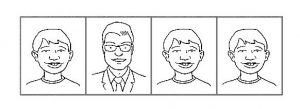Dummies and Geniuses

It’s been interesting to hear a common reaction when I describe my book “Bits to Bitcoin.” My usual pitch is that it’s an accessible guide to operating systems, networks, and security for the general reader. The listener often responds with something like “oh, so it’s a Dummies book,” and I say some version of, “Well, not exactly.”
As a brand, the Dummies people have done really well – it’s kind of amazing how readily people assume that an explanation of X for a non-specialist will be called “X for Dummies.” But I do worry a little about what that kind of self-labeling might do to people over the long run. I prefer to think of my readers as people who are smart, but they’re smart in fields or dimensions that don’t have much to do with my subject matter.
I’m a fan of Howard Gardner’s theory of multiple intelligences, so I figure that people who don’t have much inclination toward technical material are likely to be smart in other ways. There may well be some genuine dummies in the world, but there’s not much point in writing books for them. In my experience, people who are genuine dummies either don’t have much curiosity or don’t have much capacity to incorporate new information. Whichever handicap they are suffering, they’re unlikely to be interested in buying a book, and similarly unlikely to get much out of it.
Now, let’s return to people who aren’t really “dummies,” but are called that anyway: it’s surely not a new development to have people who are curious but not specialists in the field of interest. What did we call such people before we started calling them Dummies, and why did we start calling them that?
One older brand that seems to have aged poorly is the “Everyman’s Library.” There’s more than a whiff of sexism there, and perhaps also a slightly patronizing notion of curating what everyone should know. On the positive side, though, it’s aiming for nonjudgmental universalism: for each book so identified, we know that it’s intended for everyone.
Being a “Dummy” is a kind of backhanded universalism. If being unfamiliar with at least one technology makes a Dummy, then every one of us is a Dummy. And in contrast to Everyman, a Dummy is not gendered.
The transition to talking about Dummies seems to have started with the rise of computing technology in ordinary life, and the way that computers can be maddening to the uninitiated. We seem to have struck a collective bargain that we label our unfamiliarity with the ways of computing as though it were some sort of personal deficiency. Rather than complaining about the limitations of the technology, we claim the fault is ours as users.
The opposite side of this syndrome is another piece of brilliant marketing, this time from Apple: the “Genius Bar” in Apple stores. The Genius Bar is the place that you take your Apple equipment for technical assistance, delivered by “Geniuses.” I am sure that these technical support workers are skilled and competent at what they do. That said, I am likewise confident that the mechanics of a well-run service station are skilled and competent. Although we’re not inclined to call the people who fix our cars “geniuses,” somehow we are willing to use that overblown term for the people who fix our computers.
So the people who know how to fix our computers are Geniuses, and those of us who need their assistance are Dummies. But calling people Dummies, even with intended irony, seems problematic. One of the things I’ve learned over the years is to avoid unpleasant statements that are then taken back with some kind of phrase like “just kidding.” If you don’t mean to say something, then don’t say it; in this context, “Dummies” seems like institutionalized passive-aggressive behavior. One can almost imagine the eye-rolling editors and authors, assembling the books for their Dummy constituency. That’s not the relationship I want to have with my readers, and so that’s not how I want to think about the books I write.
I don’t have any trouble envisioning my reader: I can look at publications like the New York Review of Books or listen to NPR programming. There’s no shortage of content that appeals to my preferred audience of curious, intelligent, educated people. And although I might want that audience to be larger, I don’t have any trouble finding substantial numbers of potential readers. What is problematic is what to call them. I know they’re not Dummies. I know they’re not Everyman. And I guess I know they’re not the “general reader,” although that’s closer – and that term is what I have to use until someone comes up with a better description of this group.